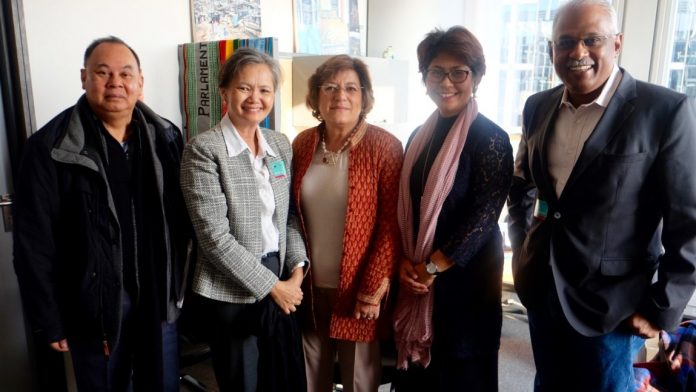Nearly 100 members of the European Parliament and legislatures across Southeast Asia sent an open letter to EU and ASEAN foreign ministers today, calling on them to take immediate action to secure the release of prisoners of conscience in Southeast Asia.
October 13, 2016
BRUSSELS, 13 October 2016 — Nearly 100 members of the European Parliament and legislatures across Southeast Asia sent an open letter to EU and ASEAN foreign ministers today, calling on them to take immediate action to secure the release of prisoners of conscience in Southeast Asia.
“The release of all prisoners of conscience would send a strong message about the joint commitment of governments in Europe and Southeast Asia to the promotion and protection of human rights and to ensuring that our cooperation achieves broad-based and sustainable benefits for our peoples,” the parliamentarians wrote.
The letter, which is signed by 93 representatives from 22 countries, comes during the 21st ASEAN-EU Ministerial Meeting (AEMM) in Bangkok, Thailand, where foreign ministers from EU and ASEAN member states are discussing issues as part of an ongoing effort to strengthen collaboration between the two regions. The biennial gathering represents an opportunity for leaders from both regions to demonstrate their commitment to stated support for universal human rights, parliamentarians said.
“As elected representatives, it is our role to ensure that the voices of our peoples are heeded by the leaders of our respective nations. It is in this role that we urge you to make good on previous promises and take immediate steps to ensure the release of those imprisoned for expressing their political or religious beliefs and peacefully taking action in support of those beliefs,” the letter reads.
In the letter, parliamentarians mention a number of high-profile cases of prisoners of conscience throughout Southeast Asia, including former Malaysian opposition leader Anwar Ibrahim, Vietnamese human rights lawyer Nguyen Van Dai, and staff from the Cambodian Human Rights and Development Association (ADHOC), a prominent NGO. The cases included in the letter do not represent an exhaustive list of all prisoners of conscience in Southeast Asia, parliamentarians noted, but rather examples of the wide variety of cases across the ten-member regional bloc.
Parliamentarians argued that there is an urgent need for European and Southeast Asian governments to back up their rhetorical commitments with concrete action, including the immediate and unconditional release of prisoners of conscience.
“Time and again, we have listened to diplomats and officials from ASEAN and international governments pledge to further human rights in the region while speaking in bilateral and multilateral forums. Yet on the ground, there are few practical improvements which result from these discussions,” said Malaysian MP Charles Santiago, Chairperson of ASEAN Parliamentarians for Human Rights (APHR) and a signatory of the letter.
“But the upcoming AEMM doesn’t have to be business as usual. By securing the release of prisoners of conscience, leaders have an opportunity to leave Bangkok having demonstrated that they mean what they say when they talk about rights.”
When ASEAN leaders met with President Barack Obama in the United States earlier this year, their joint declaration identified shared commitments to “strengthening democracy, enhancing good governance and adherence to the rule of law, [and] promoting and protecting human rights and fundamental freedoms.” The ASEAN Charter also outlines member states’ shared principles of respect for fundamental freedoms and adherence to the principles of democratic governance.
Despite these commitments, however, the ASEAN region has witnessed a dramatic shrinking of space for civil society and erosion of democratic norms and human rights protections. In the past three years, the region has seen a military takeover in Thailand, a spike in government-sponsored attacks on opposition politicians and civil society in Cambodia and Malaysia, and a so-called “war on drugs” that has resulted in extra-judicial killings and a deterioration of the rule of law in the Philippines. Meanwhile, countries like Laos and Vietnam have entrenched their authoritarian political systems and further restricted civic space.
“The regional backsliding is alarming. Independent voices of all kinds are being targeted, from land rights activists to bloggers to factory workers. Not even members of parliament are safe from persecution and arrest,” said Cambodian National Assembly Member Mu Sochua, who also signed the letter. “The EU can be an important partner in working against this negative trend, and we are glad to have the support of so many members of the European Parliament in our call for the release of prisoners of conscience.”
Europe represents ASEAN’s second-largest trading partner, and the EU has initiated negotiations on bilateral trade agreements with six ASEAN member states. The EU also is by far the largest external investor in ASEAN countries, accounting for more than a fifth of total foreign direct investment from outside the region.
“The ultimate responsibility rests with our own governments to respect the rights of their own people. But European governments must also step up and use their significant political and economic leverage to push for change,” said Santiago.
“We hope to see the ASEAN-EU relationship strengthened in a way that benefits all peoples on both continents. Political agreements must include human rights conditionality clauses, and trade deals must be negotiated in a way that protects the rights of vulnerable communities and promotes broad-based benefits.”
Read the full letter here
Source : www.aseanmp.org


